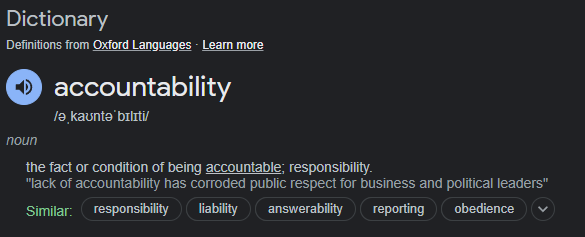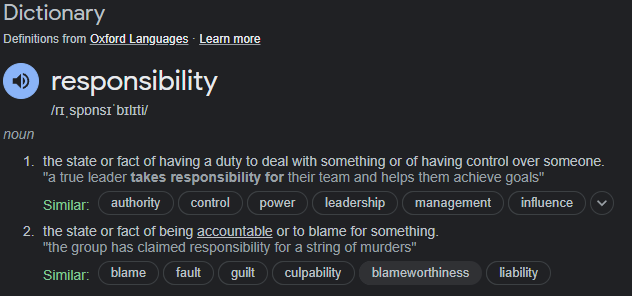Defining leadership, management and authority
The leadership lexicon is pretty fractured, for posterity my definitions are here.
Leadership
Leadership is the ability to incite action in yourself or other people, through persuasion or example.
It seems people struggle with this idea the most - that leadership is purely your ability to elicit an action in another or yourself. It sounds very simple but I can confidently assure you that it is not.
It’s important to note the use of "through persuasion or example". Coercion should not be considered persuasion in this context. Coercion most typically results in malicious compliance or open rebellion, which is the opposite to what’s being described here - the willing cooperation and participation of others.
It's necessary for groups to have some rules; leadership without coercion is having people willing to follow you without threats, punishments or other Skinner-esque tricks.
Management
Management is the design of systems for allocating resources.
In knowledge work these resources are most often time and relative priorities but they can (and should) include how to pay fairly, how to create space to allow people to grow and how decisions should be made.
Authority
Authority is the explicit or implicit power(s) and obligations conveyed to an individual by an organisation to complete a task. Typically this includes the ability to make binding decisions on behalf of the organisation in a specific domain or capacity.
For example, “line” managers are explicitly charged with team performance and thus are allocated authority over the configuration of their team (including to more or less degrees, hiring and firing).
This is a deliberate avoidance of the words accountability and responsibility. In most cases responsibilities come with authority - if you do not have the authority to make a decision, you cannot reasonably be held accountable for it.
Defining leadership, management and authority by example
These stages represent an idealised journey into a leadership position:
1. Leading yourself
You always have authority over yourself - you’re responsible for your own character if nothing else.
In all situations you can persuade yourself to build habits and behaviours (this is leadership) and design systems to apportion time and incentives (this is management). The two combined with your inalienable bodily authority describe what it means to lead yourself.
2. Finding a strong voice
If you can lead yourself you will likely influence others. Even if purely by your example, you’ll begin to shape the behaviour of the people close to you. There’s no coercion or responsibility (other than for yourself) required to show this trait - it’s simply about eliciting willful actions in others.
This type of leadership is often known as leading without authority and it’s a lifelong practice. We often forget that everyone has a boss and people always need to persuade a person or group about something.
3. Authority given recognizing leadership ability
Typically once you display leadership ability you’re eligible for organisational authority (and not before).
Organisations are averse to giving authority greater than a person's leadership skill because authority isn't enough and over time people need to be persuaded that the authority is justified or they lose faith in the organisation itself.
People often think this works in reverse and that when they are designated a leader they will be able to use that authority to get things done. This is partly true in that your position gives your arguments a weight (ethos) but you’ll quickly find forcing people to do things through authority alone is very unpopular and ineffective - even those successful leaders which order people around incessantly implicitly sell the promise of being a part of a high functioning organisation.
4. Authority given over management
Management is an aspect of an organisation but getting processes reliably followed takes someone with a proven record of leadership skill.
Being a manager gets a lot of air time - because it’s cosy, quantifiable and the literature is vast - but in essence you're being given responsibility to curate an environment of systems and people conducive to success (whatever success means to you and the organisation).
From here you're consistently working at (and with) all three parts of a leadership position; leadership, management and authority.
Forget accountability and responsibility
As a final note there are two corporate redefinitions that are so pernicious as to warrant mention here: accountable and responsible. Popularised by the RACI matrix the idea of responsibility and accountability being separate has created so much confusion as to make the terms impractical for what they're describing.
If you absolutely must use RACI you can substitute responsible for recommender and accountable for approver for it to be in-keeping with the lexicon described here.
I use the terms responsibility and accountability per their dictionary definitions:

Accountability: the fact of being responsible

Responsibility: the fact of being accountable
That’s to say they are synonyms in most situations and I consider them interchangeable as such.
Related resources
- "British Army Leadership Doctrine" containing a very similar definition
- "Let them eat cake", a famous example of how little regard Marie Antoinette was kept in and what happens to leaders that don't lead
- RACI, a popular management process
- One of the OGs on rhetoric
- Operant conditioning popularised by B. F. Skinner and a famous example of it not working